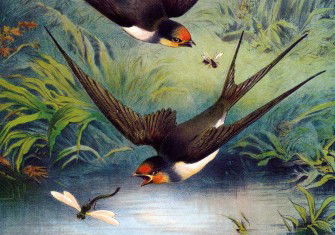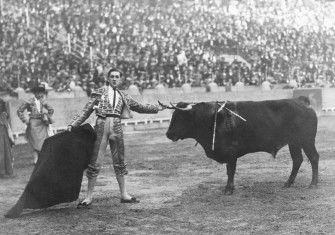The Intelligence of Earthworms
Worms are among the simplest of creatures. But, as Darwin discovered, even they share things in common with humanity.

Towards the end of his life, Charles Darwin was preoccupied with the question of whether worms think. Night after night, he would go out into the garden of Down House, armed with shovels, lamps and whistles, hoping to prove that these worms were cleverer than they looked. It was certainly an odd pastime. Anyone who happened to see Darwin, then in his seventies, beating the soil, gluing leaves together, or shouting at burrows at the top of his voice would have been puzzled, to say the least. But this was no eccentric whimsy. As Darwin knew, the problem of vermicular intelligence went to the heart of man’s relationship with animals – and threatened to destabilise his life’s work.
Dumb brutes
Philosophers had been arguing about animal cognition for more than 2,000 years. The first to tackle it were the Greeks. During the Hellenistic and Roman periods, most were inclined to believe that animals were intelligent beings, which differed from humans not in ‘essence’ but only in the extent to which they possessed reason. In De abstinentia ab esu animalium, Porphyry of Tyre argued that reason could be observed in the behaviour of ‘all animals’. They could perceive and remember; they felt pain and pleasure; they could express emotions (hope, fear, grief, etc.) and, in many cases, they even made speech-like noises, all of which was indicative of rational thought. Other thinkers went further. Sextus Empiricus believed that reason was also implied by animals’ knowledge of skills, appreciation of virtue and ability to make choices; while Plutarch found it in the care they take of their young and in their enquiring nature.
Aristotle was more sceptical. He did not doubt that animals exhibited behaviour which appeared intelligent. Nor did he deny that they had at least some capacity for processing information. But since animals do not have a concept of truth (which he thought the defining characteristic of reason), he concluded that they were incapable of rational thought – and hence fundamentally different from human beings.
Over time, Aristotle’s opinion was to win out. Attracted by his emphasis on truth as the determinant of reason, Roman authors extended the implications of his distinction between humans and animals even further. In the De officiis, Cicero argued that, while all creatures share some mental processes, man alone possesses the reason necessary to understand cause and effect, draw analogies and connect the past with the future. And since man surpassed all animals in intellect, Seneca believed that he could treat animals as he liked.
Yet it was in the works of Christian theologians that Aristotle’s views received their fullest elaboration. Seeing in his distinction between animals and humans a parallel to Biblical accounts of the Creation, the Church Fathers came to interpret Genesis 1:26 as a statement about human rationality. When we read that God created mankind in His ‘image and likeness’, Augustine argued, we should understand it to mean that human beings were endowed with the ‘divine’ qualities of reason and free will. Animals, by contrast, were irrational. Thus belonging to a lesser order of being, they deserved to be placed under man’s dominion. As Thomas Aquinas stressed, this meant that they could be killed indiscriminately. Thus sanctioned by faith, Aristotle’s distinction between animals and humans survived the centuries which followed virtually unscathed.
Intelligence or instinct?
As the Scientific Revolution dawned, all that began to change. Although most philosophers were still convinced of man’s superiority, their commitment to Aristotle’s definition of reason wavered – forcing them to cast about for some other means of demonstrating animals’ lack of intelligence. René Descartes, in his Traité du monde et de la lumière (c.1629-33), argued that, since animals could not speak, there was no proof they could think independently of external stimuli. By redefining reason as the capacity to apply a set of general principles to different situations, he also contended that, while animals sometimes appear to be acting rationally, their inability to transfer their knowledge to unfamiliar scenarios showed that they act more out of habit than intuition or deduction.

By the beginning of the 18th century, however, faith in man’s uniqueness had begun to crumble. Now that Aristotle had been rejected, others sought to define thought and reason in broader terms, which eroded the distinction between animals and humans. Leading the charge was David Hume. In A Treatise of Human Nature (1739-40), he argued that thought consisted in ‘images’ arising from sensory data and that reason should be understood as a ‘mere disposition or instinct to form associations among such [images] on the basis of past experience’. Mindful of dogs and horses, he maintained that ‘beasts are endowed with thought and reason as well as men’. A similar argument was put forward by Voltaire in his Dictionnaire philosophique (1764). Yet while it was to enjoy a certain vogue in the early 19th century, some naturalists, such as William Whewell, remained unconvinced. Clinging to the theological wreckage, they refused to grant animals the same status as men; and, in the absence of any decisive proof, showed no signs of changing their minds. An impasse was reached.
Man descends
Into the fray stepped Darwin. Born slightly over 40 years after Hume’s death, he was immersed in the new thinking. His grandfather, the zoologist Erasmus Darwin, had been a keen reader of Hume’s Treatise and such progressive ideas were a common subject of discussion in the family home. It was almost inevitable that he should take an interest in the question of animal cognition. But when he did, he approached it from a completely different perspective.
In On the Origin of Species (1859), Darwin demonstrated that, rather than having been created in a singular act by an omnipotent deity, all varieties of animal and plant life had evolved gradually, over many generations, as a result of natural selection. Pursuing the implications of this argument further in The Descent of Man (1871), he went on to contend that man, too, was ‘descended from some pre-existing form’ and had evolved in response to similar processes. As both critics and supporters realised, this confounded any attempt to distinguish between men and beasts – and raised questions about their cognitive abilities.
Like Aristotle, Darwin recognised that all species seemed to possess the physical ‘tools’ needed to process information. But unlike Aristotle he believed that these physiological continuities should be productive of cognitive similarities as well. If different species had a comparable capacity for thinking, the chances were that they thought to a similar extent, too. And if they could think, why should they not also reason? With an eye more to Descartes than Hume, Darwin held that an action was rational if it displayed some measure of forethought and went beyond instinctive responses. Whether or not a being possessed reason should be relatively easy to determine through observation of behaviour patterns.
On this basis, Darwin, like Porphyry, concluded that ‘the difference in mind between man and the higher animals’ such as dogs ‘is one of degree and not of kind’. But when it came to the ‘lower’ animals, he was less sure – especially insofar as earthworms were concerned. They were a uniquely simple form of life; indeed even Porphyry would have struggled to see them as intelligent beings. They had no obvious means of perception; did not appear to have any skills; made no noises; and certainly didn’t show any emotion. The prospect of finding any cognitive similarities with human beings seemed dim indeed.
Reshaping the landscape
Darwin, however, suspected that worms might be more impressive than they appeared. Shortly after he returned from his journey on HMS Beagle, he received a letter from his uncle (and father-in-law) Josiah Wedgwood explaining that a layer of lime and cinders which had been spread over a field had, a few years later, sunk several inches below the surface as a result of worms chewing away at the soil below and ejecting it above. So greatly did this impress Darwin that he went on to read a paper on the subject to the Geological Society later that year and became convinced that, despite their size, worms could reshape the landscape as dramatically as the wind or the tides.

But no matter how much earth passed through a worm’s intestines, it wasn’t proof of thought. Darwin therefore began conducting elaborate tests on their capabilities. As he explained in his last book, The Formation of Vegetable Mould through the Action of Worms (1881), he began with their senses. That they were deaf was easy enough to establish. He blew whistles at the ground, shouted into their burrows, played them the bassoon and placed them on a table next to a piano – all without provoking the slightest reaction. By placing them on the piano, however, he discovered that they are extremely sensitive to vibrations. He then turned to their ‘feeble’ sense of smell. Though they avidly sought out bits of cabbage and onion, they seemed indifferent to bits of cotton wool doused in tobacco juice and perfume. Most revealing, however, was their sense of sight. By shining a bright light onto their anterior part, Darwin discovered that, although they are blind, they can still perceive luminosity. Their reaction, however, was not always the same; if their attention was engaged with something else, they often ignored the light completely. This reminded Darwin of ‘higher’ animals. A keen sportsman, he knew that it was easiest to creep up on a deer when it was grazing, or otherwise occupied; and it seemed to him as if worms behaved in much the same way. This clearly pointed to ‘the presence of a mind of some kind’, but he needed more proof before he could be sure.
The manner of a man
Darwin found what he was looking for in worms’ burrows. To prevent air getting in, they have a tendency to block up the entrance to their homes using whatever is at hand. Their preference is, however, for leaves. Whereas, if they lacked reason, they might have been expected to seize them any old how, Darwin observed that they ‘acted in nearly the same manner as would a man’, dragging the leaves down into their burrows by the pointed tip, rather than by the stalk. To his amazement, they did the same thing even when given leaves from trees which are not indigenous to Britain and when presented with several leaves glued together. This could not be mere instinct. It had to be a sign of rational intelligence.
Needless to say, Darwin would have been the first to admit that worms’ thoughts are probably quite modest. But that they think at all was enough to validate his theory of evolution – and to demonstrate beyond a doubt that all living things share similar cognitive processes. This is more than just a scientific fact, though. It is also a reminder that even the most humble of creatures demand our respect. For if even the worm can think like us, what earthly reason is there not to show them the same consideration as we show one another?
Alexander Lee is a fellow in the Centre for the Study of the Renaissance at the University of Warwick. His latest book is Machiavelli: His Life and Times (Picador, 2020).






